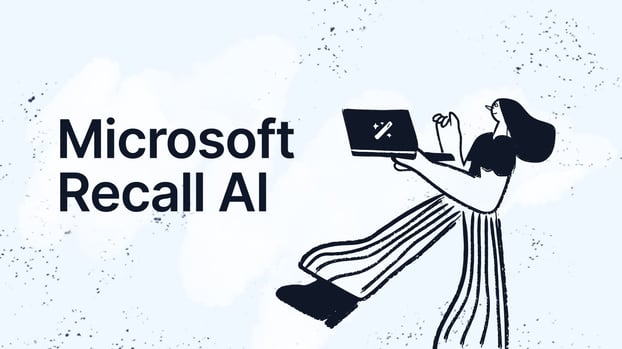Microsoft Recall AI is generating buzz, but not all of it is positive. When the feature was first introduced, the tech community was filled with excitement. However, concerns about privacy and data security quickly surfaced. While artificial intelligence (AI) promises convenience, it often comes at a cost—and in this case, that cost could be your privacy.
As we look toward a future where AI powers more of our digital experiences, opinions are divided. Some see Microsoft Recall AI as a groundbreaking productivity tool, while others worry it brings us closer to a world where personal data is no longer under our control. This divide highlights the tension between innovation and privacy that’s increasingly common in tech.
In this article, we’ll break down what Microsoft Recall AI is, how it works, and the cybersecurity concerns surrounding its release. Let’s dive in.
What is Microsoft Recall AI?
Microsoft Recall AI is a feature designed to help users "recall" important tasks, documents, and interactions. It's positioned as a virtual assistant that not only manages your to-do list but also reminds you of tasks you’ve forgotten from weeks or even months ago. Think of it as an extension of your memory, helping you stay on top of things.
It was first introduced last May, when Microsoft announced Copilot+ PCs, a new category of Windows PCs designed for AI. One -and certainly the most controversial- of its features was Recall AI.
Microsoft Recall AI announcement and capabilities
This is what Microsoft said about it: "Now with Recall, in preview starting June 18, you can access virtually what you have seen or done on your PC in a way that feels like having photographic memory. Copilot+ PCs organize information like we do – based on relationships and associations unique to each of our individual experiences. This helps you remember things you may have forgotten so you can find what you’re looking for quickly and intuitively by simply using the cues you remember". Well, that didn't happen. The backlash was huge.
According to Microsoft, they created this feature with the intention to seamlessly integrate it into its ecosystem: "Recall is designed to help you retrieve the information you need when you need it, serving as a personalized, intelligent assistant". However, this convenience comes with strings attached.
Microsoft Recall AI doesn't just provide simple reminders—it scans your emails, calendar events, meetings, and files to prompt you about missed tasks. This constant monitoring is what has sparked concern. Sure, it’s like having a second brain, but it also remembers everything—whether you want it to or not.
How does Microsoft Recall AI work?
 Microsoft Recall AI uses machine learning and natural language processing to analyze your digital activity. Unlike standard reminder systems, it doesn’t just respond to user input. Instead, it proactively scans emails, documents, and meetings to recommend follow-ups. The AI also uses data to create personalized reminders.
Microsoft Recall AI uses machine learning and natural language processing to analyze your digital activity. Unlike standard reminder systems, it doesn’t just respond to user input. Instead, it proactively scans emails, documents, and meetings to recommend follow-ups. The AI also uses data to create personalized reminders.
Here’s where it gets interesting—and a bit worrying. Recall AI takes screenshots of your activity every five seconds and stores them locally on your drive. This feature lets users scroll back through their activity timeline, complete with a search bar for easy retrieval of specific moments.
While Microsoft promotes this as a productivity boost, it raises concerns about the amount of data being captured. As Microsoft notes: “The feature can serve as a productivity enhancer by allowing users to search and retrieve information effortlessly” . However, the fact that it constantly monitors and records your screen activity is unnerving to some.
Why is Microsoft Recall AI controversial?
The controversy centers around data privacy and transparency. Microsoft Recall AI's ability to track and analyze such a wide range of user activity has led to fears of surveillance. Privacy advocates are especially concerned about the level of control users have—or rather, don’t have—over what data is collected.
One of the main points of contention is transparency. Microsoft has shared details about how the AI functions, but there’s doubt about whether users fully understand the extent of the data being captured. Additionally, critics argue that once you activate the feature, it’s unclear how much control you retain. Even if you're comfortable with Microsoft accessing your digital life for productivity purposes, the extent of that access is alarming. How much data is too much? And can users opt out at any point?
Cybersecurity concerns
The sheer volume of data Recall AI processes opens up several cybersecurity risks. If a security breach occurs, Recall AI could serve as a goldmine for cybercriminals. Sensitive emails, documents, and meetings could be exposed, leading to a potential data privacy disaster.
Even Microsoft acknowledges this: "As part of our security-first approach, we are working to ensure that Recall’s data processing adheres to the highest standards of protection and encryption".
But no system is invulnerable. Privacy experts warn that a tool like Recall AI, which centralizes so much personal information, creates a larger attack surface. And even internally, there’s the potential for abuse if employees with access to this sensitive data misuse it.

Privacy concerns
Perhaps the biggest issue is how much personal data Microsoft Recall AI collects. Your emails, files, meetings, and other digital interactions are logged and analyzed to enhance the service. However, many users question whether increased productivity is worth the privacy trade-off.
Another worry is that corporations might misuse the feature to monitor employees. Recall AI’s ability to track every meeting and email means it could easily be repurposed as a surveillance tool. This prospect has privacy advocates on high alert.

Microsoft Recall AI release date
Originally, Microsoft planned to release Recall AI with Copilot+ PCs in June 2024, but after feedback from security researchers, the launch was delayed.
According to the latest update, Microsoft will preview Recall AI with Windows Insiders starting in October 2024. This additional testing phase will allow Microsoft to fine-tune the feature before making it widely available. For those unfamiliar, the Windows Insider Program (WIP) lets selected users preview upcoming Windows features and provide feedback directly to Microsoft engineers.
This is how Microsoft announced it: "We’re committed to providing a trustworthy and secure experience. That’s why we’ve decided to leverage the expertise of our Windows Insider community before rolling Recall out to all Copilot+ PCs".
So, this features is going to be running only for WIP members prior to making it available for all Copilot+ PCs. When Recall becomes available in the WIP, Microsoft will publish a blog post with details on how to get the preview. To try it, members will need a Copilot+ PC due to their hardware requirements.
Finally, when is it going to be available for the rest of the users? We really don't know.
Is Microsoft Recall AI already on my computer?
Short answer: It’s very unlikely. Unless you’re part of the Windows Insider Program (WIP), you probably won’t be running Recall AI in the next few weeks. As mentioned earlier, Microsoft plans to release a blog with more details once the feature becomes available to Windows Insiders in October.
Additionally, this feature will not be available for retail PCs running on Intel or AMD processors—it’s limited to Copilot+ PCs. So, while there’s a small chance that you may have Recall AI if you've recently updated Windows or purchased a new PC, it’s not likely.
If you’re curious, you can check if Recall AI is installed by typing "Recall" in the Start Menu search bar. If nothing appears, the feature isn’t installed yet. If you do discover that you're running Recall AI, there is a way to disable it.
Is Microsoft Recall AI optional?
This question remains somewhat unclear. After the Windows 11 update (KB5041865), users discovered that the Recall AI could be disable (unmarked) from the Windows Features section, leading to speculation about its removal. Microsoft quickly clarified that this was a bug and promised a fix. Whether users will be able to fully uninstall Recall AI once it's officially rolled out is still uncertain. However, in a recent post, a Microsoft Community Specialist, said that "even if you do plan on getting a Copilot PC, Microsoft isn't going to force it on you" and that "you'll have the option to toggle it on or off".
Plus, past regulatory pressures, particularly in the European Economic Area (EEA), forced Microsoft to allow the removal of apps like Microsoft Edge. There’s a possibility that similar compromises will be made for Recall AI, but we won’t know for sure until its release.
To sum up
Microsoft Recall AI promises to reshape productivity, but it also raises serious questions about privacy and cybersecurity. On the surface, it seems like a tool designed to simplify life. But as we dig deeper, the amount of control it exerts over our digital lives becomes concerning.
Is this the future we want—where AI tracks our every move in the name of productivity? The conversation is far from over. What’s clear is that Microsoft Recall AI is more than just a feature—it’s a glimpse into the future of how much we’re willing to trade for convenience.
Frequently Asked Questions (FAQs)
1. What is Microsoft Recall AI?
Microsoft Recall AI helps users recall tasks and interactions by analyzing digital activities such as emails, meetings, and files.
2. Why is Microsoft Recall AI controversial?
Its extensive data collection has raised privacy concerns, especially over how much control users have over their information.
3. Can I opt out of Microsoft Recall AI?
It’s currently unclear if Recall AI will be fully optional, but Microsoft has acknowledged user concerns about privacy and control.
4. When is the release date for Microsoft Recall AI?
Microsoft plans to preview Recall AI with Windows Insiders in October 2024 before a full rollout.
5. What are the cybersecurity risks of Microsoft Recall AI?
Recall AI’s deep access to personal data could make it a prime target for cyberattacks, posing both external and internal risks.















